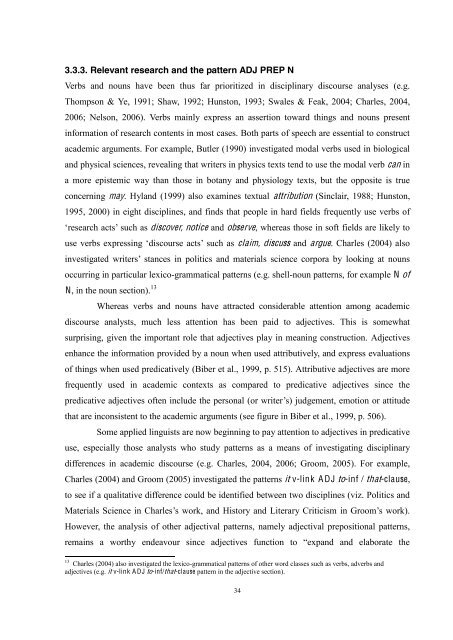Evaluative Meanings and Disciplinary Values - eTheses Repository ...
Evaluative Meanings and Disciplinary Values - eTheses Repository ...
Evaluative Meanings and Disciplinary Values - eTheses Repository ...
You also want an ePaper? Increase the reach of your titles
YUMPU automatically turns print PDFs into web optimized ePapers that Google loves.
3.3.3. Relevant research <strong>and</strong> the pattern ADJ PREP N<br />
Verbs <strong>and</strong> nouns have been thus far prioritized in disciplinary discourse analyses (e.g.<br />
Thompson & Ye, 1991; Shaw, 1992; Hunston, 1993; Swales & Feak, 2004; Charles, 2004,<br />
2006; Nelson, 2006). Verbs mainly express an assertion toward things <strong>and</strong> nouns present<br />
information of research contents in most cases. Both parts of speech are essential to construct<br />
academic arguments. For example, Butler (1990) investigated modal verbs used in biological<br />
<strong>and</strong> physical sciences, revealing that writers in physics texts tend to use the modal verb can in<br />
a more epistemic way than those in botany <strong>and</strong> physiology texts, but the opposite is true<br />
concerning may. Hyl<strong>and</strong> (1999) also examines textual attribution (Sinclair, 1988; Hunston,<br />
1995, 2000) in eight disciplines, <strong>and</strong> finds that people in hard fields frequently use verbs of<br />
such as discover, notice <strong>and</strong> observe, whereas those in soft fields are likely to<br />
such as claim, discuss <strong>and</strong> argue. Charles (2004) also<br />
s science corpora by looking at nouns<br />
occurring in particular lexico-grammatical patterns (e.g. shell-noun patterns, for example N of<br />
N, in the noun section). 13<br />
Whereas verbs <strong>and</strong> nouns have attracted considerable attention among academic<br />
discourse analysts, much less attention has been paid to adjectives. This is somewhat<br />
surprising, given the important role that adjectives play in meaning construction. Adjectives<br />
enhance the information provided by a noun when used attributively, <strong>and</strong> express evaluations<br />
of things when used predicatively (Biber et al., 1999, p. 515). Attributive adjectives are more<br />
frequently used in academic contexts as compared to predicative adjectives since the<br />
predicative adjectives often include the personal (or writers) judgement, emotion or attitude<br />
that are inconsistent to the academic arguments (see figure in Biber et al., 1999, p. 506).<br />
Some applied linguists are now beginning to pay attention to adjectives in predicative<br />
use, especially those analysts who study patterns as a means of investigating disciplinary<br />
differences in academic discourse (e.g. Charles, 2004, 2006; Groom, 2005). For example,<br />
Charles (2004) <strong>and</strong> Groom (2005) investigated the patterns it v-link A DJ to-inf / that-clause,<br />
to see if a qualitative difference could be identified between two disciplines (viz. Politics <strong>and</strong><br />
Materials Science in Charless work, <strong>and</strong> History <strong>and</strong> Literary Criticism in Grooms work).<br />
However, the analysis of other adjectival patterns, namely adjectival prepositional patterns,<br />
remains a worthy endeavour s <br />
13 Charles (2004) also investigated the lexico-grammatical patterns of other word classes such as verbs, adverbs <strong>and</strong><br />
adjectives (e.g. it v-link A DJ to-inf/that-clause pattern in the adjective section).<br />
34
















